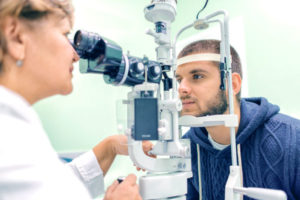 The black dot in the center of your eye is called your pupil and the colored part of your eye is called your iris. The iris controls how much light is allowed to enter your pupil by regulating the size of your pupil. Pretty amazing, right?! When you have a dilated eye exam, your eye doctor will place drops in your eye to expand your pupil to allow him to see fully into your eye. Allow us to answer FAQs about a dilated eye exam:
The black dot in the center of your eye is called your pupil and the colored part of your eye is called your iris. The iris controls how much light is allowed to enter your pupil by regulating the size of your pupil. Pretty amazing, right?! When you have a dilated eye exam, your eye doctor will place drops in your eye to expand your pupil to allow him to see fully into your eye. Allow us to answer FAQs about a dilated eye exam:
How long do my eyes take to dilate before a dilated eye exam?
It varies person-by-person depending on the eye’s reaction to the eye drop medication, but it typically takes 15 to 30 minutes for the eyes to reach full dilation after the drops are administered.
How long after my dilated eye exam does dilation last?
Also varying person-to-person, returning the eyes to normal takes approximately 4 to 6 hours. It could take some people longer to bounce back from eye dilation.
How does it feel to have dilated eyes?
During a dilated eye exam, your pupils will be expanded causing significantly more light sensitivity. Remember to bring sunglasses for when you leave, or we can provide temporary protection. People may experience blurred vision, especially if trying to focus the eyes on something small. In addition, the eyelids may feel tighter than normal.
What do I do after my exam since my eyes are still dilated?
If this is your first dilated eye exam or are uncomfortable driving after dilation, you should have someone come with you or pick you up from your appointment.
What conditions are diagnosed with a dilated eye exam?
Glaucoma
While the optic nerve is visible in an eye that isn’t dilated, dilation optimizes that view and makes it easier to spot Glaucoma, a disease of the optic nerve.
Macular Degeneration
The retina is examined through a dilated pupil, making it possible to diagnose and manage macular degeneration.
How often should I have a dilated eye exam?
Generally, starting at age 60, you should have a yearly dilated eye exam. African Americans should start their yearly dilated eye exams at age 40 – the risk of glaucoma is higher. For type 1 diabetic patients, a dilated eye exam is recommended within five years of diagnosis. For type 2 diabetic patients, there should be a dilated eye exam at the time of diagnosis.
Dilated pupil eye exams are critical for preventing and treating eye diseases of the retina and optic nerve. Trust the Vision Eye Group doctors to perform a dilated eye exam to avoid conditions that could result in vision loss.
